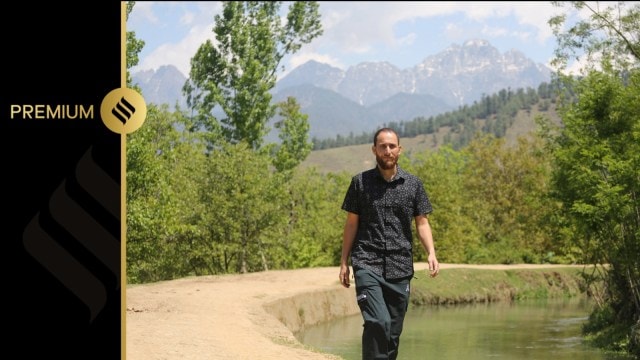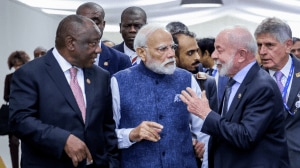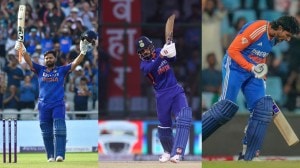‘Save the children’: Guide who helped tourists escape recalls those terrifying 10 minutes at Pahalgam meadow
Over the sound of gunshots ringing across Baisaran, Chhattisgarh resident Lucky Parashar, his face on the ground, cried out to tour guide Nazakat Ahmad Shah for help.
 Tour guide Nazakat Ahmad Shah. (Express Photo/Shuaib Masoodi)
Tour guide Nazakat Ahmad Shah. (Express Photo/Shuaib Masoodi)“Whatever happens, save the children.”
Over the sound of gunshots ringing across Baisaran, Chhattisgarh resident Lucky Parashar, his face on the ground, cried out to tour guide Nazakat Ahmad Shah for help.
The firing in the Pahalgam meadow started just short of 2 pm on April 22. In barely 10 minutes, “three terrorists in dark clothes” shot dead 26 people, including a local pony ride operator, and injured several others. As cries of pain, shock and grief broke out, the terrorists melted into the forest nearby.
Earlier that day, four couples and three children, including Lucky’s family, had travelled with 31-year-old Nazakat to sightsee around Pahalgam, a one-day stop in their Kashmir itinerary. At the ticket counter, the guide greeted his cousin — 30-year-old Syed Adil Hussain Shah, the ill-fated pony operator — before entering the park.
Nazakat, who has been working as a tour guide since 2010, has known Parashar’s family for years. For four months each year, his family sells shawls and other Kashmiri goods in Chhattisgarh. Two of his brothers, too, are involved in the tourism sector, helping yatris traverse the Amarnath route every year.
At around 2 pm, Nazakat approached Lucky, who was near one end of the zipline that runs through the park, to ask if his family was ready to move to the next spot.
“I wanted to take them to ‘ABC’ — Aru Valley, Betaab Valley and Chandanwari (in Pahalgam). Lucky said the children really loved Baisaran and wanted to stay there a while longer,” says Nazakat, recalling how the three children in the group shrieked with joy as they ran all over the meadow.
 As the gunshots grew louder, Nazakat knew he had to get out if he wanted to stay alive. (Express Photo/Shuaib Masoodi)
As the gunshots grew louder, Nazakat knew he had to get out if he wanted to stay alive. (Express Photo/Shuaib Masoodi)
In the middle of his exchange with Lucky, he remembers the echo of a loud ‘crack’. It was followed by another. And then a volley of shots.
“It took me a minute to realise what was happening. This place is so remote, so peaceful that even a local like me did not immediately realise that we were under attack,” he says.
As soon as he realised the danger, Nazakat grabbed the youngest child in the group, a boy aged two, followed by the other two. Holding them close, he lay flat on the ground, just like the others lying prone nearby. While Lucky lay next to him, his wife and the rest of the group were elsewhere in the park.
Chhattisgarh BJP youth wing worker Arvind Agrawal, who was also part of the group, had told The Indian Express earlier that his four-year-old daughter was among those Nazakat had shielded.
As the gunshots grew louder, Nazakat knew he had to get out. The ticket gate was too far. As he looked around for another way out, Nazakat spotted a gap in the fence.
“Lucky told me, ‘whatever happens, save the kids’. I have two daughters myself, he did not have to explain. I had spotted three people in dark clothes walking in the meadow earlier…. I had to think about the children first,” he says.
 Arvind Agrawal with Nazakat
Arvind Agrawal with Nazakat
Amid the gunshots, Nazakat called up the driver he had hired to ferry the family, instructing him to take a different route and meet him “near the spring that flows close to the park”. A split second later, he grabbed the three children, and, with Lucky, made a beeline for the gap in the fence.
“The taxi driver had heard the gunshots too. He also took a while to realise that it was the sound of bullets,” says Nazakat.
Running along the spring, Nazakat, the children and Lucky reached the car 10 minutes later. Once the children were inside, Nazakat turned around — back towards the meadow and the gunshots — to track down the remainder of his group.
The gate near the ticket counter was open, he recalls, allowing those on the park’s periphery to get away. At the fence, he saw pony wallahs rushing panicked tourists down the slope on ponies even as shots continued to ring. “It had rained two days ago. The path was still extremely slippery,” he says.
Despite the chaos, Nazakat managed to locate all seven remaining members of his group. He says he took the stunned tourists back to their hotel in Pahalgam.
The next day, April 23, he accompanied them to Srinagar airport, nearly 80 km from Pahalgam. “They were scared. They wanted to leave Srinagar. I knew that no matter what I said, they would not stay back if they could leave,” he says.
Srinagar airport was overrun with victims, their families, panicked tourists and VIPs. Lucky’s family failed to get a flight out. “They were scheduled to leave on April 24 anyway. They ended up taking the same flight,” he says.
It was on his way to Srinagar on April 23 that Nazakat found out about his cousin succumbing to the bullet injuries he had sustained during the attack. Adil, too, was attempting to save some tourists in the park when he was shot. “It struck me then that in my rush to get the guests out, I had forgotten to check on Adil,” he says.
On Friday, April 25, three days after the attack, Nazakat was still in Pahalgam, still answering calls from “customers who are now friends”. “They have been checking on my well-being since Tuesday. Many tourists who I’ve travelled with earlier have been calling too to check on me and my family.”
Before answering yet another “wellness check” from one of his “friends”, Nazakat says: “People in the centre of the bowl (at the park) bore the brunt of the attack. I don’t know how I would have lived with myself had one of my guests been injured or worse.








- 01
- 02
- 03
- 04
- 05























